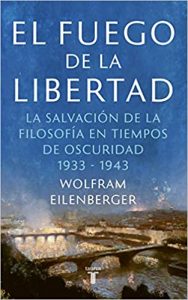Own Wolfram Eilenberger He pointed it out very well in an interview when he stated that it was dangerous to believe that philosophy helps to achieve happiness. Ask your compatriot Nietzsche, who so close to reaching the Olympus of wisdom to succumb to the hell of madness (unless his final megalomania was a divine access misunderstood a second time by man, unable to discover God again on earth in the philosopher's eccehomo).
But what would be the man without philosophy? The mind also needs its orgasms, its ramblings and its vices. I do not know what role philosophy will play at the moment in the most humanistic subjects of the institutes (well, I also do not know if there is even any humanistic subject in these centers).
The thing is that there is nothing better than verifying the reach of philosophy in young people to demonstrate precisely that, that thought and its abstractions awaken the hunger of the youngest minds, because it is precisely the philosophical that excites the imagination to the greatest extent and intelligence in the impossible balance of our ambitions, limitations and undiscovered emotions.
The thing is that Eilenberger besides being a philosopher is a publicist like Beigbeder o Nevo. A trio of authors who are well acquainted with the psyche and its springs to awaken the need, the pleasure or everything that can lead us towards movements never suspected. In this case everything points to a taste for philosophy and Eilenberger disguises himself as our particular Virgilio ...
Top recommended books by Wolfram Eilenberger
Magicians time
The XNUMXth century was another kinder place for philosophy. And that which is precisely not that it served to provide light in a world recurrently shadowed by wars. But it is that the second is inherent to the human being engrossed in his reason and the conflict by opposition. Philosophizing was something else and his magic was the journey of this book ...
We are in 1919. The war has just ended. "Dr. Benjamin runs away from his father, Second Lieutenant Wittgenstein commits economic suicide, Assistant Professor Heidegger abandons the faith, and Monsieur Cassirer works on the streetcar for inspiration." A decade of exceptional creativity begins that will forever change the course of ideas in Europe. The twenties of the twentieth century in Germany shaped our contemporary thinking, and are the true origin of our modern relationship with the world. Understanding them means, in some way, understanding each other.
Ludwig Wittgenstein, Walter Benjamin, Ernst Cassirer and Martin Heidegger, four giants of all time, led this revolution and elevated German to the language of the spirit. It was in a Germany torn between the will to live and the abyss of the economic crisis, between the lust of Berlin nights, the conspiracies of the Weimar Republic and the threat of National Socialism, that they found their voice and their style.
En Wizards time, everyday life and metaphysical dilemmas are part of the same story. With a splendid narrative style, Eilenberger draws connections between the ways of life and the theories of these four seductive and brilliant philosophers, guided by the need to answer the key questions of the history of thought. Their responses also illuminate the dangerous times we live in today.
The fire of freedom
Tackled the thought after the Great War we reached the heart of the thought in World War II (No one could suspect back in 1918 that the fat woman would arrive shortly after). And the matter gives even more play. Perhaps not with the same brilliance as in his first work of this type, but also delving into essences that enrich our notion about the twentieth century that was yesterday.
The decade from 1933 to 1943 marked the saddest chapter in modern Europe. Amid the horror, Simone de Beauvoir, Simone Weil, Ayn Rand and Hannah Arendt, four of the most influential figures of the XNUMXth century, showed what it means to lead a truly emancipated life while developing their visionary ideas about relationship. between the individual and society, man and woman, sex and gender, freedom and totalitarianism, and God and humanity.
With great narrative ability and a masterful balance between biographical account and analysis of ideas, Eilenberger offers us the story of four legendary lives that, in the midst of upheaval, as refugees and resistance fighters, ostracized and enlightened, they changed our way of understanding the world and laid the foundations for a truly free society.
Their adventures took them from Stalin's Leningrad to Hollywood, from Hitler's Berlin and occupied Paris to New York; but, above all, they gave rise to his revolutionary ideas, without which our present, and our future, would not be the same. Their trajectories show how philosophy can also be lived and are an impressive testament to the liberating power of thought.


